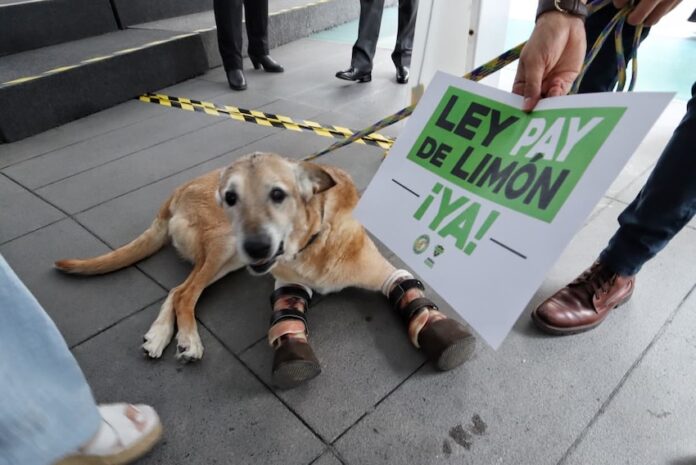A group of animal rights activists has presented a bill to the Mexican Senate that seeks to classify animal abuse as a serious crime and guarantee the rehabilitation of impacted animals.
The bill takes its name from “Pay de Limón” (lime pie), the name of a dog who survived torture and mutilation by the criminal group Los Zetas in Fresnillo, Zacatecas. Her story has become a symbol of the fight against animal cruelty in Mexico.
The proposed law seeks to impose prison sentences of over two years for individuals who commit any act of animal cruelty, with stricter penalties for repeat offenders and cases of severe violence.
“Pay de Limón, who is currently 15 years old, is here thanks to Fresa, who was hit in the face with an axe at a butcher shop just because she was hungry. She’s here thanks to Berenjeno, whose spine was broken with blows from a baton. Pay is here for Nuguet, who was burned alive. Because of Limoncito, whose nose, ears, tail and penis were cut off by children, with his eyes gouged out,” said Patricia Ruíz, founder of the organization Milagros Caninos, which rescued Pay in 2011.
The initiative also establishes accessible reporting mechanisms and requires authorities to thoroughly investigate crimes against animals. Furthermore, it guarantees medical care, rehabilitation and protection for abused animals.
In pursuing their legal campaign, activists have cited a 1983 study conducted in the United States, observing that animal abuse occurred in 88% of homes in which physical child abuse was being investigated. The study found that if a child is cruel to animals, it may be a sign that serious abuse or neglect has been inflicted on the child by a caregiver.
“Animal abuse is not an isolated or minor problem,” Jerónimo Sánchez, head of the NGO Animal Heroes and one of the activists who submitted the initiative to the Senate said in a statement. “It is a social barometer that predicts other forms of violence. Every time a case is ignored, a social threat is allowed to grow.”
Senate passes legislation that enshrines animal welfare in Constitution
Local media have also reported data from civil organizations and local prosecutors’ offices showing that more than 200,000 cases of animal abuse are reported each year in Mexico. However, this figure is likely an underestimate, as many cases remain undetected.
Adriana Buenrostro, the political director of Animal Heroes, called on the Senate to include the initiative on the national agenda.
“The country cannot continue normalizing violence. Legislating animal abuse as a serious crime is not only justice for animals, but also a strategy for security and social cohesion,” she said.
How is animal abuse punished in Mexico?
The penalties for animal cruelty vary widely across Mexico. Most states recommend a minimum prison sentence of six months and a fine, which ranges from 50 to 500 days of minimum wage.
Mexico City, Oaxaca, Sinaloa, Chiapas and Jalisco, among other states, have recently reformed their local laws to impose harsher punishments on abusers and strengthen protections for animals. In July, Mexico City Mayor Clara Brugada opened a special investigative agency for cases of animal abuse, which will focus exclusively on prosecuting those who commit cruelty against animals as well as those who manage, organize, establish or sponsor spaces intended for the slaughter of animals.
With reports from Infobae, El Comentario, Excelsior and Pulso
